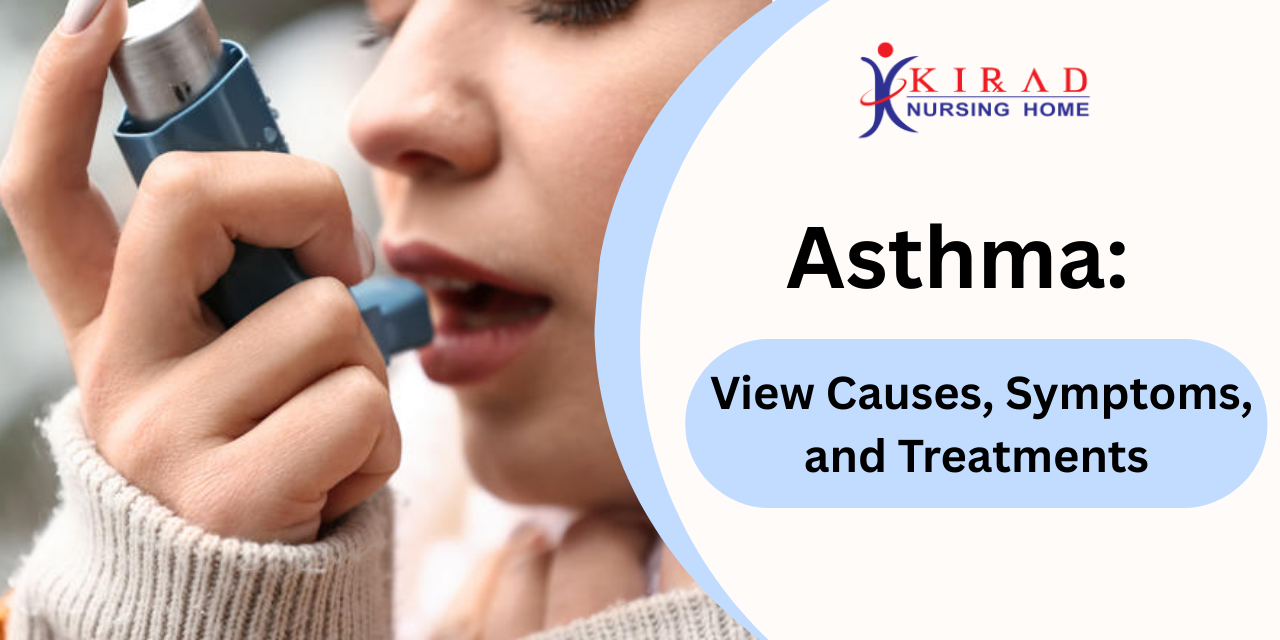Asthma is a chronic respiratory condition that affects millions of people worldwide. It causes inflammation and narrowing of the airways, making it difficult to breathe. While asthma is not curable, with the right medical care, lifestyle adjustments, and early intervention, it can be effectively managed, allowing individuals to live active and healthy lives.
Many people underestimate asthma, treating it as just “occasional breathing trouble.” However, without proper treatment, asthma can worsen over time, cause frequent hospital visits, and in severe cases, even become life-threatening. As a practicing physician, I have seen firsthand how timely diagnosis and treatment can prevent long-term complications.
What is Asthma?
Asthma is a chronic condition that affects the bronchial tubes, the passages that carry air in and out of the lungs. In asthma patients:
- The airways become inflamed.
- They produce excess mucus.
- The muscles around the airways tighten.
This combination leads to narrowing of the airways, making it harder to breathe. Asthma symptoms often come and go, triggered by different factors such as dust, smoke, exercise, or allergies.
Common Causes and Triggers of Asthma
While the exact cause of asthma isn’t always clear, it often develops due to a combination of genetic and environmental factors. Common triggers include:
- Allergens – Pollen, dust mites, mold, pet dander.
- Air Pollution – Smoke, vehicle emissions, industrial fumes.
- Respiratory Infections – Colds, flu, bronchitis.
- Exercise – Particularly strenuous activity in cold air.
- Weather Changes – Cold air or sudden temperature shifts.
- Strong Emotions or Stress – Can cause rapid breathing, worsening symptoms.
- Certain Medications – Such as beta-blockers or aspirin in sensitive individuals.
Symptoms of Asthma
Asthma symptoms vary from person to person. Some experience mild symptoms occasionally, while others may have severe, daily flare-ups. Common signs include:
- Shortness of breath
- Wheezing (whistling sound when breathing)
- Persistent coughing, especially at night or early morning
- Chest tightness or pressure
- Difficulty exercising or climbing stairs due to breathlessness
If these symptoms worsen suddenly, it may lead to an asthma attack, which requires immediate medical attention.
Types of Asthma
Asthma is not the same for everyone. Different types include:
- Allergic Asthma – Triggered by allergens like pollen or dust.
- Non-Allergic Asthma – Caused by smoke, infections, or stress.
- Exercise-Induced Asthma – Symptoms appear during or after physical activity.
- Occupational Asthma – Triggered by workplace irritants such as chemicals or dust.
- Childhood Asthma – Common in children but may improve with age.
Diagnosis of Asthma
Diagnosing asthma involves:
- Medical History & Symptom Review – Identifying triggers, frequency, and severity.
- Physical Examination – Listening to breathing patterns.
- Lung Function Tests – Such as spirometry, which measures airflow.
- Allergy Testing – To check if allergens are contributing factors.
Asthma Treatment Options
While there is no permanent cure, asthma can be managed effectively with a combination of medication and lifestyle changes.
1. Medications
- Inhalers (Bronchodilators) – Provide quick relief by relaxing airway muscles.
- Corticosteroid Inhalers – Reduce inflammation for long-term control.
- Leukotriene Modifiers – Tablets that reduce inflammation and mucus production.
- Biologic Therapies – Advanced injections for severe asthma cases.
2. Lifestyle Modifications
- Avoid known triggers like smoke, dust, and strong perfumes.
- Keep home and workspaces clean and dust-free.
- Exercise regularly but at a comfortable pace.
- Eat a balanced diet to support lung health.
3. Emergency Action Plan
Patients should work with their doctor to create a personalized asthma action plan that outlines what to do during flare-ups and when to seek emergency help.
Why Early Management Matters
Asthma is manageable, but untreated asthma can:
- Lead to frequent hospitalizations.
- Increase the risk of chronic lung damage.
- Affect work, school, and daily activities.
- Reduce overall quality of life.
With timely diagnosis and treatment, most patients can control their asthma and avoid long-term complications.
Asthma in Children
Children with asthma often show signs such as persistent coughing, wheezing, and shortness of breath during play. Early management is crucial, as uncontrolled asthma can affect growth, sleep, and school performance. Parents should consult a doctor if their child shows recurring breathing difficulties.
Living with Asthma – Patient Education
- Stay Consistent with Medications – Skipping inhalers often leads to flare-ups.
- Monitor Symptoms – Keep track of attacks and triggers.
- Vaccinations – Flu shots and pneumonia vaccines help prevent infections that can worsen asthma.
- Stay Active – With proper management, asthma patients can still exercise and lead a normal life.
Asthma may be a lifelong condition, but with the right care and awareness, it doesn’t have to control your life. Early diagnosis, consistent treatment, and avoiding triggers are the keys to managing asthma effectively.
As Dr. Girish Kirad – Diabetologist, Chandan Nagar, I encourage patients not to ignore breathing difficulties, as timely medical intervention can greatly improve quality of life. With proper treatment, most asthma patients can enjoy a full, healthy, and active lifestyle.
Frequently Asked Questions (FAQs)
- Is asthma curable?
No, asthma cannot be cured, but it can be effectively managed with medications and lifestyle changes. - Can asthma worsen with age?
Yes, untreated asthma can worsen, but with proper care, symptoms can remain stable and manageable throughout life. - Are inhalers safe for long-term use?
Yes, inhalers prescribed by your doctor are safe and essential for controlling symptoms. - Can exercise trigger asthma?
Yes, intense exercise can trigger symptoms in some people, but with proper treatment, most patients can stay active safely. - When should I see a doctor for asthma?
If you experience frequent breathlessness, wheezing, or nighttime coughing, consult a doctor immediately for diagnosis and treatment.







